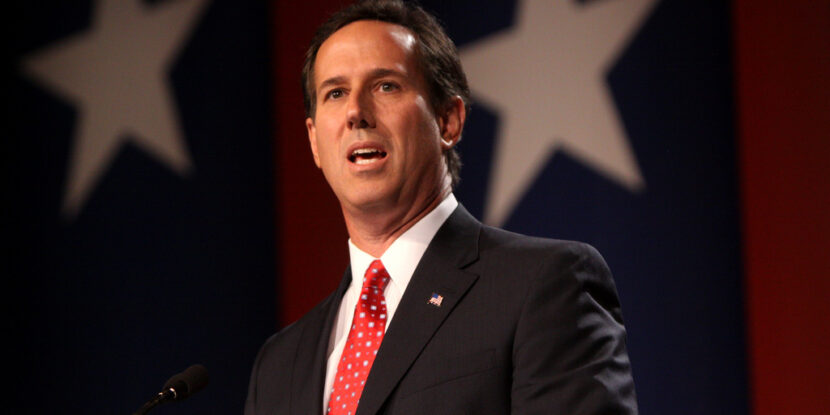At the National Press Club on Thursday, Rick Santorum was asked about the Supreme Court’s same-sex marriage decision. He slammed Justice Anthony Kennedy’s majority opinion as “ramblings” containing “all sorts of interesting ideas, none of which are based in the Constitution.
You can check out the video or read the transcript below:
JOHN HUGHES: Senator, you have compared the Supreme Court decision making gay marriage a constitutional right to the Dred Scott decision justifying slavery. What, as president, could you do to fight back against something that you oppose on moral grounds, but that is now a constitutional right?
RICK SANTORUM: Well, I would say this, that I didn’t compare the recent decision of the court with Dred Scott, Justice Roberts compared the two. I was simply quoting Justice Roberts’ opinion, where he compared – he said the legal basis that undergirded Dred Scott was the same legal basis that is undergirding this decision. They both had, quote, in his words, ‘no constitutional basis’ for this decision. Having read Justice Kennedy’s decision, it is not a legal work. It is not a work of legal scholarship. It is simply, in my opinion, the ramblings of someone who wanted to get a decision, and came up with all sorts of interesting ideas, none of which are based in the Constitution.
The court has the authority – let’s take the case of birthright citizenship. There is a legal dispute as to what the language of the Fourteenth Amendment means. It is, to me, something that people on both sides of this issue have very legitimate arguments. I could not say that – if someone said to me that the Constitution doesn’t permit birthright [citizenship], I can’t say for certain that they’re wrong. And I don’t think for certain they can say that we’re wrong. I think that’s one of these situations where the court must step in, and has a role of stepping in, in making these types of decisions.
What they don’t have the right to do is to create new constitutional rights. That is not within their purview. There is nothing that historically – Congress and the president have said that they give the court broad latitudes to pretty much do whatever they want to do when it comes to the Constitution of this country. And when the court oversteps its bounds as it has in cases, then it is the responsibility of the president, the people, the Congress to say that the court has to be held accountable and the law has to be changed. That of course takes all of those things. It does take a president, it does take the people, it does take the Congress. And if there isn’t support to do that, then the court wins. Even though they may have done something unconstitutional, the court wins, because the other branches of government are incapable of successfully challenging them.
Here’s my point when it comes to who should be – if there’s one branch of government that should have more leeway in changing the Constitution, I would make the argument it should be the president and the Congress. And the reason is that the president and the Congress can be thrown out if the public finds their decisions to be abhorrent or objectionable. The problem with the court is we can be stuck with a court for 30 years. And they are insulated and isolated from the American public, and as a result, their actions can be much more insidious than the actions of a president or Congress. When a president or Congress stands up to a court and says, ‘You’re wrong,’ and pushes back, as I did in the case of the partial-birth abortion statute back in 2003, where the court found a similar statute unconstitutional, I was undeterred. We passed an almost identical statute, passed it, and said we were going to enforce it, and the court backed down, because, I think, they knew they were off base. That has to happen, in my opinion, more when the court goes astray.
Thomas Valentine is a researcher for APIA and a junior at the Franciscan University of Steubenville.


